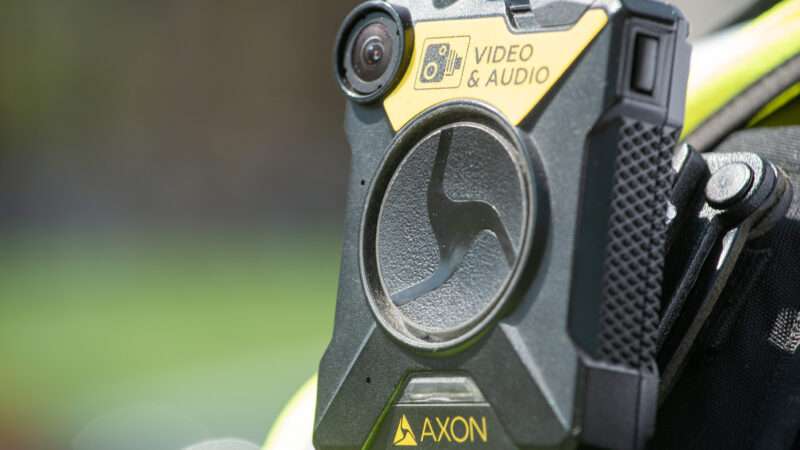
Ohioans will now likely have to pay hundreds of dollars to see police videos after Republican Gov. Mike DeWine signed a large bill into law late Thursday night that includes a provision allowing police departments to charge for dashboard, jailhouse surveillance, and body camera footage.
DeWine declined to exercise his line-item veto power over the provision, citing the burden on small police departments inundated with time-consuming requests for body camera footage. However, media organizations, civil liberties groups, and transparency advocates argue that the amendment to Ohio's Sunshine Law, which was tucked into a last-minute omnibus bill and never received any public debate, will make police oversight prohibitively expensive.
Gunita Singh at the Reporter's Committee for Freedom of the Press (RCFP) tells Reason that the amendment is "a step backwards when we need to be moving forward on the issue of greater sunlight over body worn camera footage."
"The public and the press rely on Ohio's access provisions to timely receive important government documents, including those of police departments; nothing—especially costly, unnecessary fees—should stand in the way of fostering the transparency and accountability that our public records laws are designed to facilitate," Singh says.
Under Ohio's new law, departments can charge requesters up to $75 per hour of footage in labor costs for reviewing, redacting, and uploading it. Total fees are capped at $750, and agencies can choose to release the footage for free.
In a press statement, DeWine said, "Law enforcement-worn body cameras and dashboard cameras have been a major improvement for both law enforcement investigations and for accountability."
"However, I am sensitive to the fact that this changing technology has affected law enforcement by oftentimes creating unfunded burdens on these agencies, especially when it comes to the often time-consuming and labor-intensive work it takes to provide them as public records," DeWine continued.
DeWine called the bill "a workable compromise to balance the modern realities of preparing these public records and the cost it takes to prepare them."
But Singh and the RCFP argue that shifting those fees onto the public will have an inevitable chilling effect. In fact, a coalition of government watchdog and press freedom groups convinced the California Supreme Court of just that in 2020, when the court ruled that agencies must bear the cost of redacting body camera footage.
"The Reporters Committee for Freedom of the Press submitted a friend-of-court brief in that case and explained that allowing the government to charge for editing such footage threatens public access to crucial electronic records, because those fees serve as a deterrent," Singh says. "So too, here."
Such footage has become incredibly important in the public debate over policing and criminal justice. As Cleveland's ABC News 5 noted, its investigative reporters "routinely break stories with footage obtained by police. Many of them have to deal with police shootings, such as the 2022 death of Jayland Walker—who was shot nearly 50 times by eight Akron officers."
Despite their great promise, body cameras only work as a tool for accountability when there is meaningful public access to footage. The North Carolina legislature, for instance, made body camera footage off-limits to public records requests, releasable only through a judge's order.
Excessive costs can have the same practical effect as an outright ban. For example, Reason recently filed public records requests with the City of Miami for police body camera footage of two arrests made during sweeps of homeless encampments. It received an invoice for more than $300. A media outlet can probably afford to pay that, but how many times? Would an individual concerned citizen be willing to shell out that money to see whether police were respecting the civil rights of vulnerable residents?
DeWine and other lawmakers who supported the amendment also said the target of the legislation wasn't citizen watchdogs and local news outlets, but social media influencers and for-profit internet streamers, who were flooding departments with requests for body cam footage.
"My response to that was, well, don't sneak it into a bill and pass it at the last minute without hearings," Gary Daniels, chief lobbyist with the American Civil Liberties Union of Ohio, told the Columbus Dispatch. "Let's have this proceed as legislation typically does. That gives an opportunity for people, for stakeholders, for law enforcement to come in and talk about the impact and ramifications of doing this."
The post Ohio Lawmakers Sneak In a New Law to Charge Public for Police Body Camera Videos appeared first on Reason.com.







